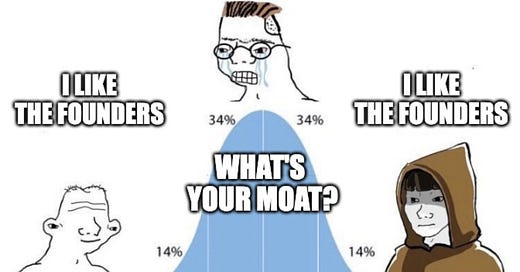I get asked a lot — especially by LPs — how we pick founding teams we invest in. At a high level, we invest in legendary people solving problems we care about. “Problems we care about” amounts to areas covered by our thesis and our vision of the future, which you can read about here. In this post, I want to talk about how we identify “legendary people”.
Why focus on people? It’s the only constant in a pre-seed company. Early-stage companies are rollercoasters. Means and circumstances can change overnight — do you trust the founders to navigate, adapt, and persevere through the ups and downs of the start-up marathon with authority?
As a VC, I want to feel convicted that I’m wiring money to an absolute legend when I close a deal. Some of the best deals I’ve done came from investments where I was iffy about the means of solving the problem, but I loved the problem space and the founders for it. I’ve also made angel investments in the past (I don’t anymore) where I fell in love with the means but was iffy on the founders— those have been some of my most catastrophic investments. But, of course, there is no magic bullet.
While I think it’s difficult to rubric humans, I have guiding principles that I’ve refined from a few years of venture investing to assess the legendaryness of a founder (in as minimal time as possible). I also refer to these archetypes as “cockroaches” (yes, I’ve completely co-opted our friends at Boost VC’s framing, before someone yells). However, as with everything else in venture, this criteria will likely continue to be refined over time.
Without further ado, Earthling VC’s cockroach manifesto (reminder, we are a pre-seed VC):
Top decile speed of execution. I’ve observed that teams that move fucking fast tend to drive better outcomes. This is also completely logical: pre-seed to seed growth is defined by traction on a limited timeline. The first iteration of anything is likely never “the one”, as such failing quicker gives teams more shots to find what works. Similarly, once teams find what works they can start scaling with greater magnitude. Everyone wins.
Resourcefulness. Does this team produce high output relative to its input, measured in time and/or money? Teams that can do a lot with little often iterate quickly (as mentioned above) and are more adaptive to extenuating circumstances, such as nuclear winters in the venture market (as was the case in 2022/23). Success in venture, particularly in the early stages, is often just about surviving long enough to reap tailwinds. Resourceful teams have a much higher chance of survival than teams that are incessantly dependent on venture funding to stay afloat.
A “secret” or unique insight. As Peter Thiel says, the greatest entrepreneurs “built their businesses on unique ideas”. Does this team understand something about the market, or have some access point, that very few others have at this point in time? In my experience, I find that teams building on a novel insight tend to become category leaders early and face little to no competition in their early stages. This is an ideal place to be when thinking about pre-seed to seed progression. Note, that unique insights can be acquired by teams that have top decile speed of execution.
Commitment to the problem space. Venture is a long, brutal war of attrition— Is this team obsessed and committed enough to see it through? Particularly in hot sectors (like AI recently) it’s easy to come across tourist founders who are starting companies on the back of the hype, and not from a place of deeply rooted conviction, that will quit when the going gets tough. We don’t back these kinds of founders, even if they have good ideas (many do). Backgrounds that indicate a founder’s commitment often also come with a unique insight (and survivability).
To be candid, it’s rare to find a founding team who’s extraordinary on all 4 axes at pre-seed, so usually we invest when we have strong conviction on a subset of criteria. However, I will add that speed of execution or resourcefulness is almost always a factor driving our overall conviction.
Hope this is helpful for any founder reading.




